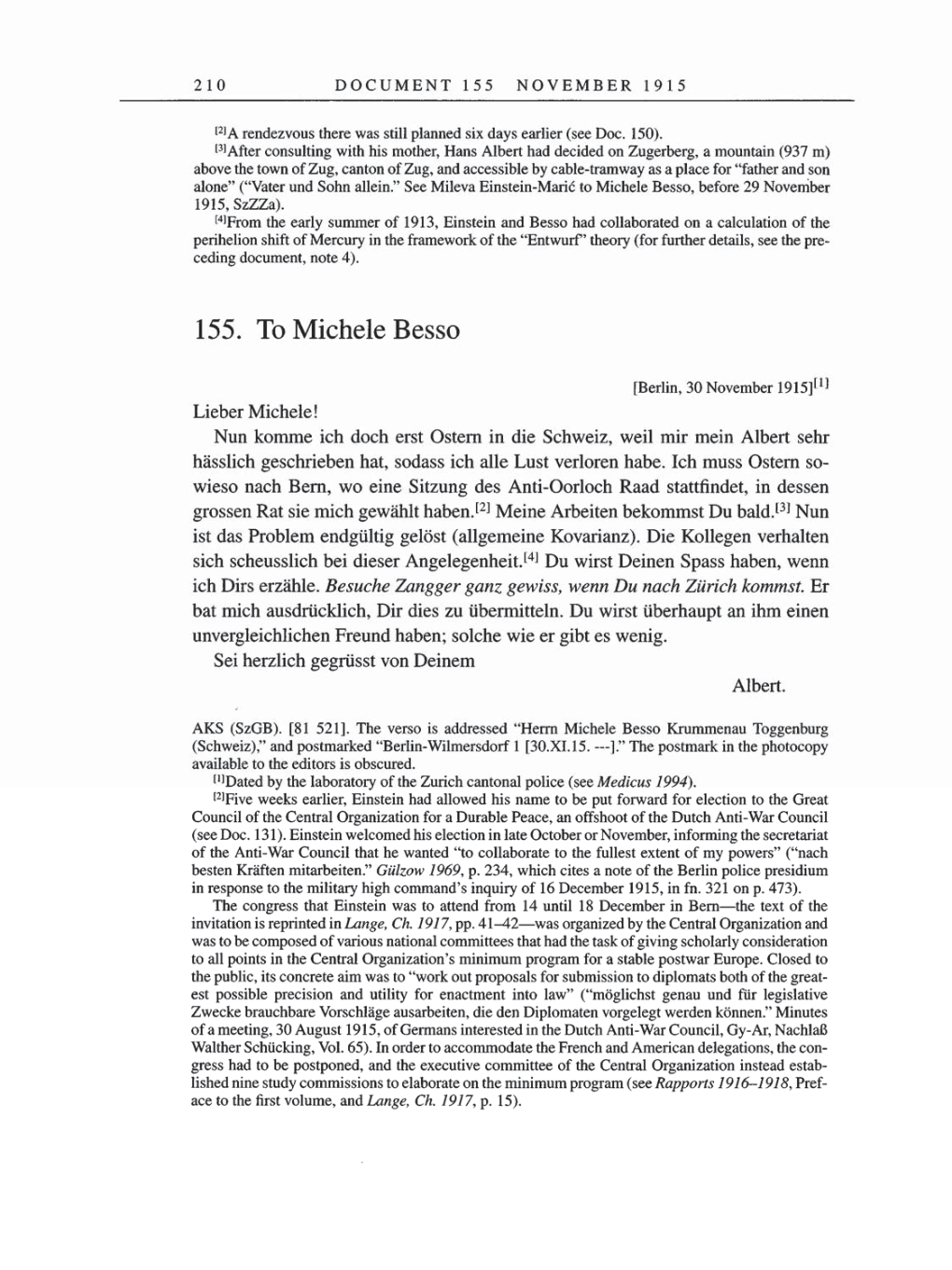210 DOCUMENT 155 NOVEMBER 1915
[2]A
rendezvous
there
was
still
planned
six
days
earlier
(see
Doc.
150).
[3]After
consulting
with his
mother,
Hans
Albert
had decided
on Zugerberg, a
mountain
(937 m)
above the town
of
Zug,
canton
of
Zug,
and accessible
by cable-tramway as a
place
for “father and
son
alone”
(“Vater
und Sohn allein.” See Mileva
Einstein-Maric
to Michele Besso, before 29
November
1915, SzZZa).
[4]From
the
early
summer
of
1913,
Einstein and Besso had
collaborated
on a
calculation
of
the
perihelion
shift
of
Mercury
in the framework
of
the “Entwurf”
theory (for
further
details,
see
the
pre-
ceding document,
note
4).
155. To
Michele Besso
[Berlin,
30 November
1915][1]
Lieber Michele!
Nun komme ich doch
erst
Ostern
in
die
Schweiz,
weil
mir
mein Albert sehr
hässlich
geschrieben hat,
sodass ich alle
Lust
verloren habe. Ich
muss
Ostern
so-
wieso nach
Bern,
wo
eine
Sitzung
des Anti-Oorloch Raad
stattfindet,
in dessen
grossen
Rat sie
mich
gewählt
haben.[2]
Meine Arbeiten
bekommst
Du
bald.[3]
Nun
ist das Problem
endgültig gelöst (allgemeine Kovarianz).
Die
Kollegen
verhalten
sich scheusslich bei dieser
Angelegenheit.[4]
Du wirst Deinen
Spass
haben,
wenn
ich Dirs erzähle. Besuche
Zangger
ganz gewiss,
wenn
Du
nach
Zürich kommst.
Er
bat mich
ausdrücklich,
Dir dies
zu
übermitteln. Du wirst
überhaupt an
ihm einen
unvergleichlichen
Freund
haben;
solche wie
er gibt es wenig.
Sei herzlich
gegrüsst
von
Deinem
Albert.
AKS
(SzGB).
[81
521].
The
verso
is
addressed
“Herrn Michele Besso Krummenau
Toggenburg
(Schweiz),”
and
postmarked “Berlin-Wilmersdorf
1
[30.XI.15. ---].”
The postmark in the
photocopy
available
to
the editors is obscured.
[1]Dated
by
the
laboratory
of
the Zurich
cantonal police
(see
Medicus
1994).
[2]Five
weeks
earlier,
Einstein had allowed his
name
to be
put
forward
for
election to the Great
Council
of
the Central
Organization
for
a
Durable
Peace,
an
offshoot
of
the
Dutch
Anti-War Council
(see
Doc.
131).
Einstein
welcomed his election in late October
or
November,
informing
the secretariat
of
the Anti-War
Council
that he wanted “to
collaborate
to
the fullest
extent
of
my powers”
(“nach
besten Kräften mitarbeiten.” Gülzow
1969,
p.
234,
which cites
a
note
of
the
Berlin
police presidium
in
response
to the
military
high
command’s
inquiry
of
16
December
1915,
in fn. 321
on p.
473).
The
congress
that Einstein
was
to attend
from
14
until
18
December
in
Bern-the
text
of
the
invitation is
reprinted
in
Lange,
Ch. 1917,
pp.
41-42-was
organized by
the Central
Organization
and
was
to be
composed
of
various national committees
that
had the task of
giving scholarly
consideration
to all
points
in the
Central
Organization’s
minimum
program
for
a
stable
postwar
Europe.
Closed to
the
public,
its concrete aim
was
to
“work
out proposals
for submission to
diplomats
both
of
the
great-
est
possible
precision
and
utility
for
enactment into law”
(“möglichst genau
und für
legislative
Zwecke brauchbare
Vorschläge
ausarbeiten,
die den
Diplomaten vorgelegt
werden können.” Minutes
of
a meeting,
30
August 1915,
of
Germans
interested
in the Dutch Anti-War
Council,
Gy-Ar,
Nachlaß
Walther
Schücking,
Vol.
65).
In order
to
accommodate the French and
American
delegations,
the
con-
gress
had to be
postponed,
and the executive
committee of
the Central
Organization
instead estab-
lished nine
study
commissions
to elaborate
on
the minimum
program (see
Rapports 1916-1918,
Pref-
ace
to
the first
volume,
and
Lange,
Ch. 1917,
p. 15).
